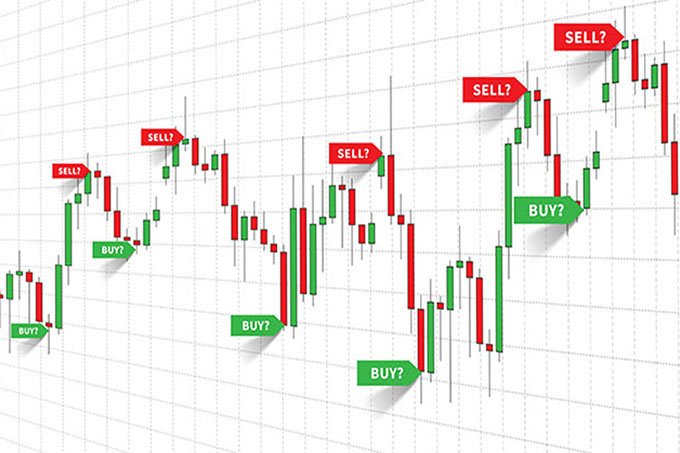The DailyForex glossary has hundreds of Forex terms explained by experts. Have a question about Forex? Get the answer in our Forex glossary now!
Most Recent
Clearing refers to the process each financial transaction undergoes. In banking, it is the transfer of funds from one account to another via a clearing bank. In finance, clearing is the exchange of capital for securities through a clearing house or clearing broker. Clearing ensures the seller has the securities and receives funds, and the buyer has sufficient funds and receives the purchased securities.
A candlestick chart forms the backbone of technical analysis and remains a cornerstone of many analysts. It includes crucial price action data and displays it in easy-to-read candlesticks. They are colored price bars that allow skilled traders to derive essential information about the potential direction of an asset. Candlestick patterns offer reliable and time-tested signals and insights about price action. Given the fast-paced nature of financial markets, the more data analysts can get within a short time, the more efficient the portfolio output.
A coincident indicator is a quantitative economic indicator that fluctuates (more or less) in lockstep with the overall state of the economy. Hence, it represents the economy's current state. At the same time, it is important to note that coincident indicators do not always reflect existing situations due to collection and reporting lags. Factory output, manufacturing, and trade sales growth, as well as household income, are some of the coincident indicators.
Top Forex Brokers
The Chicago Mercantile Exchange (CME), sometimes referred to as the Chicago Merc, is a regulated futures and options exchange, the largest of its kind in the world. Agro, fuel, market index, Forex, interest rates, precious metals, housing, and even meteorology are among the industries in which the CME trades futures and, in most instances, options.
Closing purchase is a transaction where a trader or an investor intends to reduce or close a particular financial instrument. It is popularly known as “buy to close” among traders, especially option traders.
A bull in finance purchases securities aiming to sell at a higher price and is the opposite of a bear in the ongoing bulls vs. bear battle. So, what is bull? Knowing the difference between a bull and a bear helps deploy appropriate strategies. We will outline what a bull in finance is by examining the characteristics and showing examples, helping you understand the bull meaning in stock market conditions.
A brokerage connects clients to financial markets, the custodian of brokerage accounts, and the go-between between buyers and sellers, receiving a fee per transaction. A traditional brokerage, also known as a brick-and-mortar or full-service brokerage, formed the backbone of the financial system. Self-managed portfolios rose in popularity, but trading costs at a full-service brokerage were high, discouraging active trading and favoring low-frequency buy-and-hold portfolios. Online or discount brokerages emerged at the turn of the millennium. Over the past decade, algorithmic trading and robo-advisories started to disrupt the market. Regardless of the brokerage, it all begins with a brokerage account. We will discuss the brokerage meaning, describe types of brokerage accounts, and help you make an informed decision with brokerage account examples.
A closed position is a trade that is no longer active as closing a position involves nullifying the initial position. It eliminates exposure to market risk. Closed position is commonly referred to as “position squaring” in Forex trading.
CHIPS (Clearing House Interbank Payments System) is the major clearing house for significant financial transactions in the United States. By 2015, it was processing about 250,000 interbank transactions in cross-border and national transactions every day, totaling over US$1.5 trillion every day. We'll go over all you need to know about the Clearing House Interbank Payments System today.
Bonuses & Promotions
When we look at how the stock market works, we primarily only think about big investors, their agents, and so on. We often miss out on several other important roles. The role of a chartist is one such example. While chartists play a very important role in the stock market, they do not come into the limelight. Today we will learn about chartists and talk about their role in the stock market. This guide is for anyone who wants to know more about how the stock market works.
The Deutsche Bundesbank, often abbreviated as Bundesbank or BUBA, is the German central bank, part of the European System of Central Banks (ESCB), where it is its most influential member. The Bundesbank became the first central bank to gain complete independence. The model is known as the Bundesbank Model, which contrasts with the New Zealand Model, under which central banks have government-set goals, for example, an inflation target.
Most people have heard the term broker and usually associate it with financial markets, but what is a broker, and do you need one? There are numerous types of brokers serving various industries, primarily investment brokers, insurance brokers, and real estate brokers. Regardless of the industry, a broker is an individual or firm acting as an intermediary between two parties. A broker is not always necessary, and we will give a broker example below. In most industries where a broker operates, it is either impossibly or inconvenient to deal without one.
Subscribe
Sign up to get the latest market updates and free signals directly to your inbox.A cross-trader refers to a buy and a sell order in the same asset at the same price, a frequent condition at brokers and asset managers with millions of orders. While cross-trading has a negative reputation and remains banned in some countries due to the possibility of misuse, cross-trading, if executed according to rules and regulations, can improve pricing, and increase order execution speed, especially in volatile markets.
A cross-currency swap is an agreement between two parties to exchange interest payments and principal in two currencies. The primary purpose of a cross-currency basis swap is to access lower borrowing costs. A cross-currency swap is a derivative contract traded over the counter (OTC), and both parties can customize it to their liking. Since two parties swap capital, neither one must report it on their balance sheet, as the principal amount is identical.
Cross hedging in trading is a hedging strategy using two positively correlated assets. Traders must distinguish between the “what is cross hedging” definition and the difference between cross hedging, beta, and delta hedging.








